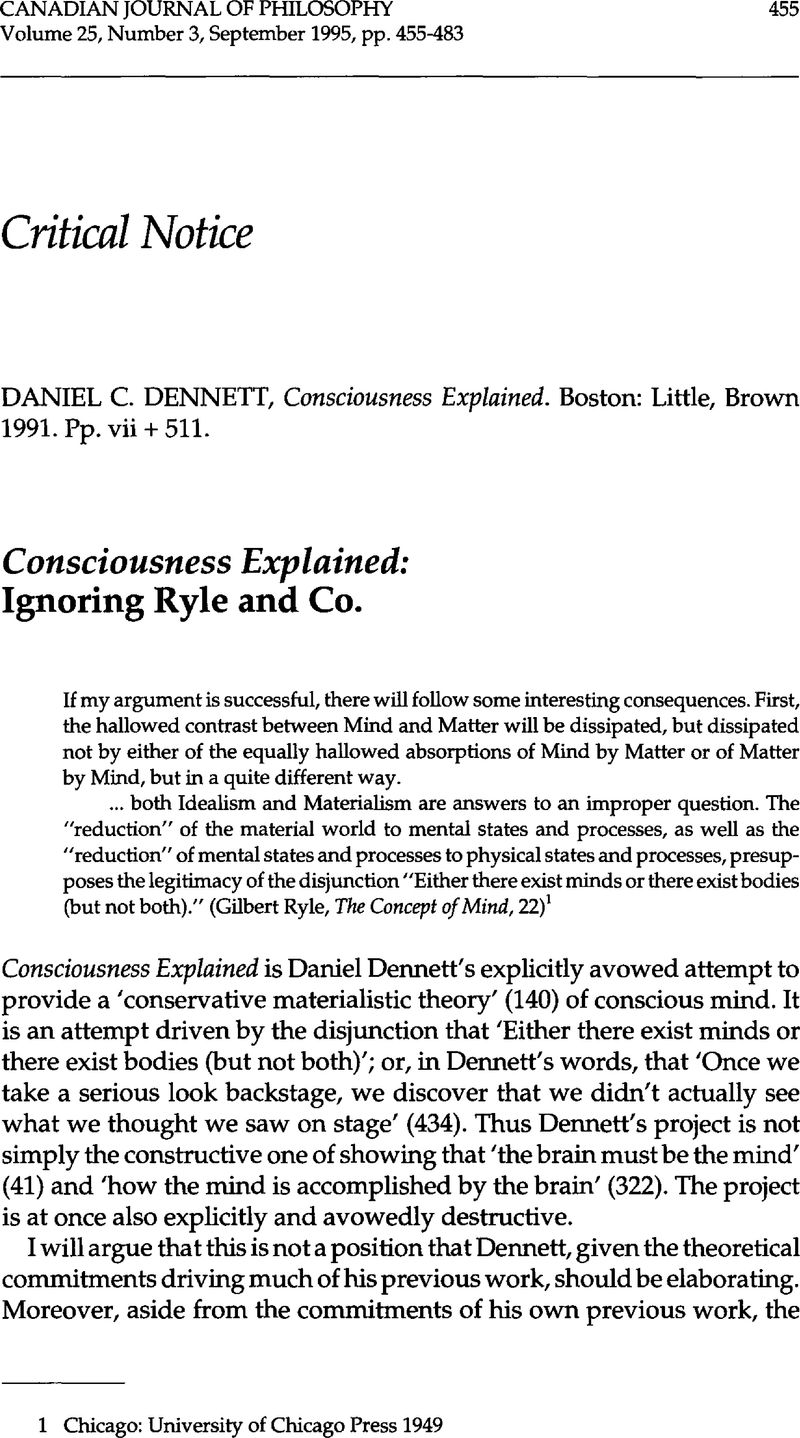Article contents
Daniel C. Dennett Consciousness Explained. Boston: Little, Brown 1991. Pp. vii+ 511.
Review products
Published online by Cambridge University Press: 01 January 2020
Abstract

- Type
- Critical Notice
- Information
- Copyright
- Copyright © The Authors 1995
References
1 Chicago:University of Chicago Press 1949
2 Gilbert Ryle, The Concept of Mind; Sellars, Wilfrid ‘Empiricism and the Philosophy of Mind,’ Science, Perception and Reality (London: Routledge & Kegan Paul 1963)Google Scholar; Wittgenstein, Ludwig Philosophical Investigations, trans. Anscombe, G.E.M. (Oxford: Blackwell 1953)Google Scholar
3 See Dennett's, ‘Intentional Systems,’ Brainstorms (Montgomery, VT: Bradford Books 1978)Google Scholar; ‘The Intentional Stance,’ The Intentional Stance (Cambridge, MA: The MIT Press 1987); and especially ‘Real Patterns,’ The Journal of Philosophy 89 (1991). For an outstanding discussion of ‘Real Patterns’ and of considerations about patterns in theorizing about mind more generally, see Haugeland's, John ‘Pattern and Being,’ in Dahlbom, B. ed., Dennett and his Critics (Oxford: Basil Blackwell 1993).Google Scholar
4 See John Haugeland's argument that elements of certain types of patterns are not identifiable with elements that can be individuated independently of their part in those patterns in ‘Pattern and Being.'
5 It is interesting to note, and I grateful to William Seager for reminding me, that Donald Davidson has also made this point using the notion of switching the subject matter. See ‘Mental Events’ and ‘Philosophy of Psychology,’ reprinted in Essays on Actions and Events (Oxford: Clarendon Press 1980). In the latter essay Davidson writes: ‘When we attribute a belief, a desire, a goal, an intention or a meaning to an agent, we necessarily operate within a system of concepts in part determined by the structure of beliefs and desires of the agent himself. Short of changing the subject, we cannot escape this feature of the psychological; but this feature has no counterpart in the world of physics’ (230, my italics). This is especially noteworthy in light of the divergence between Dennett and Davidson that results from Dennett's understanding of rationality. I go on to examine this divergence in Davidson's and Dennett's positions.
6 Content and Consciousness (London: Routledge & Kegan Paul 1969), 93-4; my added Emphasis
7 On one readind, Dennett's claim that examination of subpersonal facts switches the Topic away from personl facts cannot stand on its own because it asserts from within the manfest image that manifiest facts are part of a distinct matter and so are distinct from the facts revealed inscitific explanations. According to this interpretation, it is precisely because the assertion is made from within the manifest image that it cannot advance a claim about the relation of manifest and scientific facts. Hence the claim is taken to depend on how theoretical debates about the distinctness of intentional and design systems and semantic and syntactic engines turn out.
Alternatively, the distinctness of personal and subpersonal facts may be interpreted as making explicit something in the manifest image which is not dependent of how things tum out in the scientific image. Namely, manifest pain is a fact about the person as a whole. As such, the subject matter of pain is different from anything concerning parts of persons. On this reading, a claim about the manifest image made from within that image can have implications for the distinctness of manifest facts without depending on more theoretical debates.
8 Davidson, ‘Psychology as Philosophy,’ 231CrossRefGoogle Scholar
9 See ‘Intentional Systems.’
10 See Elbow Room (Cambridge, MA: The MIT Press 1984), Ch. 2 ‘Making Reason Practical.’
11 See Elbow Room, Ch. 2 especially 28-9.
12 The thesis that manifest features of conscious experience are not real unless there are corresponding features at the micro time durations of the causal basis is analogous to the thesis that manifest features of physical objects are not real because they are lacking at the micro spatial scale. The latter thesis cannot be claimed to be the received view about spatial properties in the philosophy of science. Rather, it is countered by a ‘plurality of distinctive explanations’ type of approach. I mention the analogy so as to point to a lacuna in Dennett's argumentation. Dennett's discussion focuses on the verificationist (or operationist) assumption that a feature is not real unless it makes a discernible difference in behavior. However, that assumption does not come into play unless one has already accepted the thesis that features and distinctions must persist at micro temporal durations. Dennett does not raise this more fundamental issue, thus giving the reader the impression that there is only one rather than two controversial matters here. If one does not accept the thesis that features must persist across spatial and temporal scales, there is no need to get exercised about Dennett's verificationism.
13 This example is McDowell's, John; see his ‘The Concept of Perceptual Experience,’ Philosophical Quarterly 44 (1994).CrossRefGoogle Scholar
14 Dennett, Daniel ‘The Message is: There is no Medium,’ Philosophy and Phenomenological Research 53 (1993).CrossRefGoogle Scholar
15 For a detailed presentation of this thesis, see my ‘The Vehicle-less nature of experiential content.’
16 I present a detailed argument for this claim in ‘The Vehicle-less Nature of Experiential Content.’
17 See Wilfrid Sellars, ‘Empiricism and Philosophy of Mind.’
- 1
- Cited by




